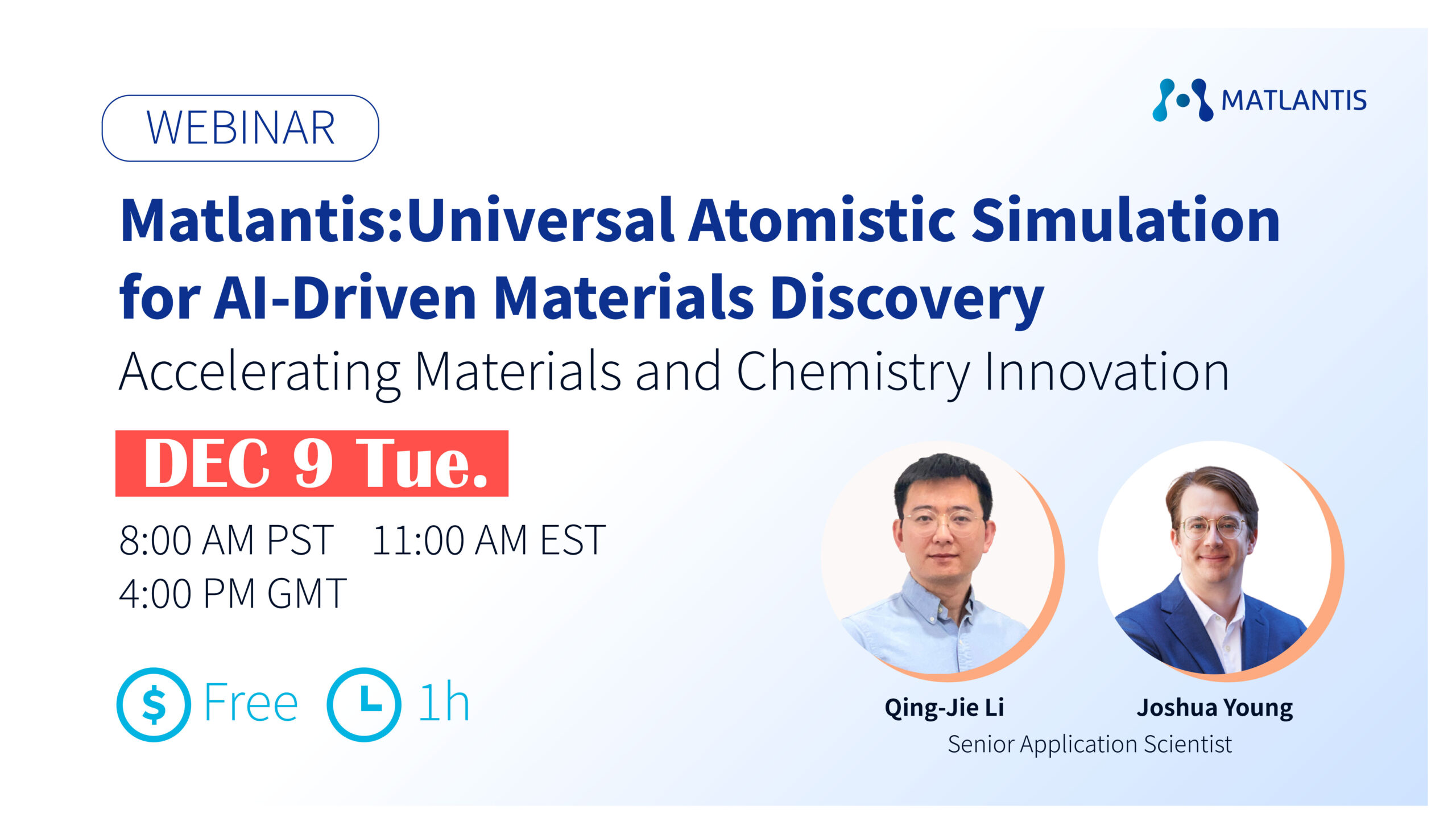Past News
User Community
Online2023.7.21 (JPN)
The 3rd "Matlantis User Conference" was held
We will be holding the third Matlantis User Conference.
This time, we will have two Matlantis users and a member of Preferred Networks, the developer of Matlantis, speaking at the event.
This users' meeting is also open to those who are considering using Matlantis or would like to try it in the future. However, since the program does not include an introduction to the basic functions of Matlantis, you will be able to enjoy the content even more if you check the overview of Matlantis (Atomistic simulation tutorial, Chapter 1 Introduction) before participating.
Date and time/How to participate
| Date and time | Friday, July 21, 2023 13:00-15:00 |
| place | Online (Zoom) |
| Participation fee | Free (pre-registration required) |
| Capacity | 500 attendees |
| Application Deadline | Thursday, July 20, 2023 18:00 |
| Application Form | https://pfcc.connpass.com/event/284478/ |
Timetable
| 13:00 – 13:05 | opening Preferred Computational Chemistry, Inc. Rabi Shibata |
| 13:05 – 13:45 | Solid catalyst research using Matlantis Professor Takashi Toriyao, Hokkaido University |
| 13:45 – 14:25 | Matlantis for complex phenomena analysis and materials screening : Application to lubricant design ENEOS Corporation |
| 14:25 – 14:55 | Calculating reaction paths and transition states using Matlantis Preferred Networks, Inc. |
| 14:55 – 15:00 | Closing Preferred Computational Chemistry, Inc. Rabi Shibata |
Content Introduction
Lecture 1
title
Solid catalyst research using Matlantis
Speakers
Professor Takashi Toriyao, Hokkaido University
Biography
September 2015: Completed doctoral course at Osaka Prefecture University Graduate School of Engineering, obtained Doctorate (Engineering)
October-November 2015: Japan Society for the Promotion of Science Research Fellow (PD)
December 2015: Assistant Professor, Catalysis Science Institute, Hokkaido University
January 2016 - March 2022: Kyoto University, Catalysis and Battery Unit, Special Assistant Professor (concurrent)
Overview of the lecture
There is still a large gap between theory and experiment in solid catalyst research, and it is difficult to verify hypotheses and predict catalyst properties without conducting experiments. The main reasons for this include the fact that the individual catalytic functions are not clear due to the heterogeneity of the solid surface, and that catalytic substances undergo dynamic mutations under reaction conditions. In this context, it is expected that research on solid catalyst systems that are difficult to evaluate using existing first-principles calculations can be accelerated by performing high-speed and high-precision catalyst simulations using Matlantis. In this presentation, we will introduce our recent efforts in solid catalyst research using Matlantis.
Lecture 2
title
Understanding Complex Phenomena and Materials Screening with Matlantis: Application to Lubricant Design
Speakers
ENEOS Corporation
Biography
April 2008 - March 2011: Doctoral course, Department of Applied Chemistry, Graduate School of Engineering, Tohoku University
Engaged in research into environmentally friendly engine oil additives using various computational chemistry methods
April 2008 - March 2011: Japan Society for the Promotion of Science Research Fellow (DC1)
March 2011: Obtained a PhD in Engineering
April 2011 - January 2021: Hitachi Research Laboratory, Hitachi, Ltd., Materials Innovation Center
Engaged in materials development through both experiments and molecular simulations
February 2021-present: Joined ENEOS Corporation Central Research and Development Laboratory
Engaged in material design using molecular simulation and MI utilizing past experience
Overview of the lecture
In these days when global warming has become a global issue, energy saving and high efficiency are required not only for products such as automobiles and home appliances, but also for the industrial equipment and manufacturing processes that manufacture them. Therefore, there is a growing need for materials that contribute to reducing friction loss in the sliding parts of the components that make up the equipment and in machining. The plastic processing of aluminum products scattered around us is no exception, and the lubricants used in processing are required to improve various performances such as low friction and anti-seizure. In this presentation, we will report on the results of clarifying the complex interfacial phenomena of lubricants using Matlantis and selecting the molecular structure of lubricants that contribute to low friction from a huge group of compounds based on that.
Lecture 3
title
Calculating reaction paths and transition states using Matlantis
Speakers
Preferred Networks, Inc.
Biography:
In 2021, he completed his doctoral studies in chemistry at Osaka University Graduate School. He joined Preferred Networks in the same year and has been in his current position since April 2021. He specializes in exploring catalytic reaction paths using density functional theory and machine learning potentials.
Overview of the lecture
This presentation will discuss how to search for reaction paths and transition states using Matlantis. In particular, we will focus on a method to prioritize search from desired reactions using domain knowledge. The domain knowledge of chemists is used to create initial values for reaction path optimization, and the optimization of reaction paths and transition states can be made to proceed automatically, making it easier to benefit from Matlantis's high-speed potential. In this presentation, we will introduce a method to create initial values for reaction path optimization using a program that creates rough reaction paths to be implemented in Matlantis, and a method to automatically optimize rough reaction paths to obtain reaction paths and transition states using ReactionStringFeature already provided in Matlantis.
Notes
We may decline your application to participate in the Matlantis User Conference at our discretion, for example if we receive an application from a competitor. We appreciate your understanding in advance.
公開日:2023.05.24


